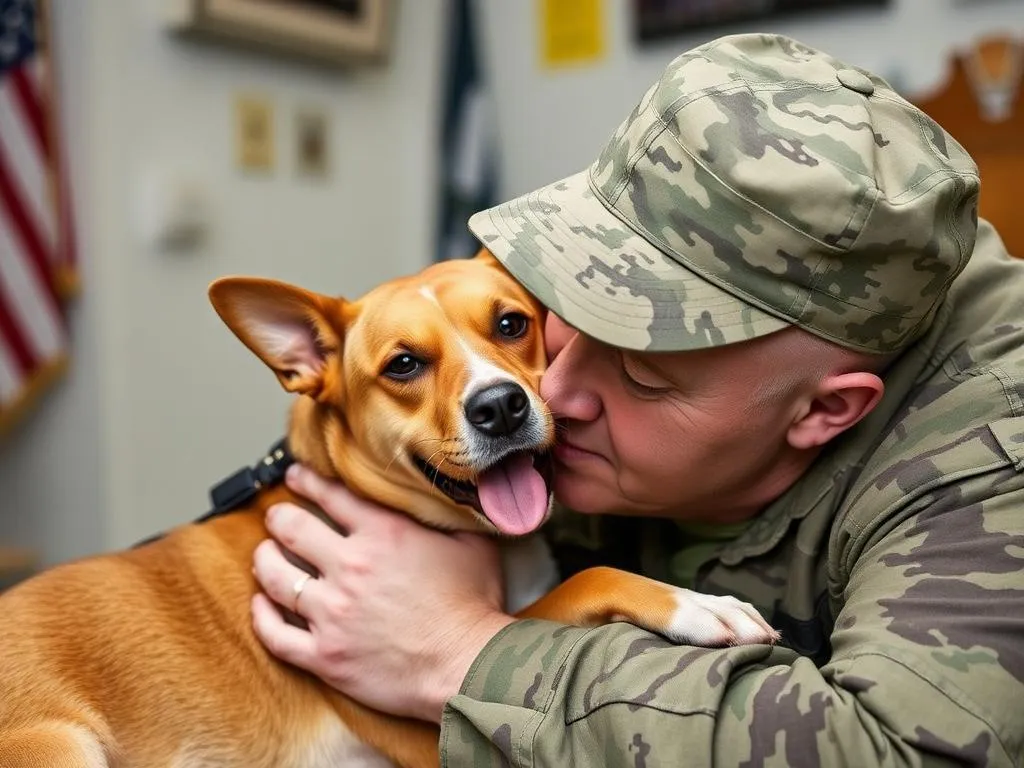
Having a pet can provide emotional support and companionship, especially for military personnel who often face unique challenges. Balancing the demands of caring for pets while serving in the military can be overwhelming, but understanding dog health care is essential for maintaining a happy and healthy pet. This article aims to provide military families with comprehensive guidance on dog health care, highlighting the resources and strategies necessary for effective pet care while serving.
Understanding Dog Health Care
Importance of Regular Health Check-ups
Routine veterinary visits are crucial for ensuring your dog’s health. Regular check-ups allow veterinarians to monitor your dog’s overall well-being and catch potential health issues before they become serious. These visits typically include:
- Physical examinations to assess your dog’s health.
- Vaccination schedules to keep your pet protected against common diseases.
- Preventive care recommendations, such as dental cleaning and parasite control.
Creating a vaccination schedule tailored to your dog’s needs will help ensure they remain healthy and protected, especially when traveling to new locations.
Common Health Issues in Dogs
Understanding the prevalent diseases and conditions that can affect dogs is vital for military families. Common health issues include:
- Obesity: A growing concern that can lead to serious health problems, including diabetes and joint issues.
- Skin allergies: Often caused by environmental factors, leading to itching and discomfort.
- Ear infections: Common in certain breeds, these can be painful and require veterinary attention.
Recognizing the signs and symptoms, such as lethargy, changes in appetite, or unusual behaviors, can lead to early detection and treatment of health issues.
Nutritional Needs of Dogs
Providing a balanced diet is one of the most important aspects of dog health care. Nutritional needs can vary based on breed, age, and health status. Key considerations include:
- High-quality dog food: Look for brands with real meat as the primary ingredient.
- Age-specific diets: Puppies, adult dogs, and senior dogs require different nutritional profiles.
- Special dietary needs: Some dogs may need specific diets due to allergies or health conditions.
Consulting with a veterinarian about your dog’s dietary requirements can help ensure they maintain optimal health, especially during relocations.
Challenges of Pet Care in Military Life
Frequent Relocations
Frequent moves can significantly impact a dog’s health and well-being. Changes in environment can disrupt routines and lead to anxiety. Here are some tips for maintaining a routine during transitions:
- Establish a travel plan: Prioritize your dog’s comfort during moves by having a designated travel crate and familiar items.
- Set up a new routine quickly: Try to replicate your pet’s previous schedule as closely as possible in the new environment.
- Explore the new area: Allow your dog to acclimate to their surroundings by taking them on walks and visiting local parks.
Maintaining consistency can help ease the transition for both you and your pet.
Deployments and Separation
Deployments can create emotional stress for both military personnel and their pets. Pets may experience anxiety and confusion during their owner’s absence. To minimize stress, consider the following strategies:
- Designate a caretaker: Choose a trusted friend or family member to look after your pet while you’re away.
- Leave familiar items: Ensure your dog has access to their favorite toys and blankets to provide comfort.
Understanding how your dog reacts to separation can help you prepare and mitigate anxiety during deployments.
Limited Access to Veterinary Services
Military families may find themselves in remote locations with limited access to veterinary care. In such cases, consider:
- Mobile veterinary services: Research local mobile vets that can provide care at your home.
- Telehealth options: Utilize telemedicine services for minor health concerns, allowing you to consult with a veterinarian remotely.
Proactive planning can help ensure your dog receives necessary care even in challenging circumstances.
Preparing for the Unexpected
Emergency Preparedness
Creating an emergency plan for pets is essential for military families. Consider the following steps:
- Emergency kit: Prepare a pet emergency kit with essential supplies, including food, water, medications, and a first aid kit.
- Identification: Ensure your dog has a collar with an ID tag and is microchipped for easy identification in case of separation.
Having a plan in place can make a significant difference in ensuring your pet’s safety during unforeseen situations.
Identifying Pet Care Resources
Several resources are available for military-affiliated pet care services. These can include:
- Military pet care programs: Organizations such as the American Society for the Prevention of Cruelty to Animals (ASPCA) offer support specifically for military families.
- Local resources: Familiarize yourself with local veterinarians, boarding facilities, and pet supply stores to ensure you have access to necessary services.
Identifying these resources early can help alleviate stress when you need assistance.
Managing Pet Care While Deployed
Designating a Caregiver
Choosing a responsible caregiver for your dog while you are deployed is crucial. Here are some tips for selecting the right person:
- Trustworthiness: Ensure the caregiver is reliable and has experience with dogs.
- Clear communication: Provide detailed instructions about your dog’s routine, feeding schedule, and any medical needs.
Regular communication with the caregiver can help ensure your pet is receiving the care they need in your absence.
Establishing a Routine
Consistency is key for your dog’s well-being. Establishing a routine for your caregiver can help maintain stability for your pet. Consider creating a care guide that includes:
- Feeding schedule: Include specific times and portion sizes.
- Exercise regimen: Outline daily walks and playtime activities.
- Medication reminders: If your dog requires medication, provide clear instructions.
A well-structured routine can help your dog feel secure and cared for, reducing anxiety during your deployment.
Keeping in Touch with Your Dog
Maintaining a connection with your dog while deployed can ease both your and your pet’s anxiety. Consider these techniques:
- Video calls: Use apps that allow you to see and speak to your dog, helping them recognize your voice and presence.
- Regular updates: Ask your caregiver to send photos and videos to keep you informed about your dog’s well-being.
This connection can provide emotional comfort for both you and your pet.
Resources for Military Pet Owners
Military Support Programs
Various programs offer support to military pet owners, helping with everything from training to emergency assistance. Some of the benefits include:
- Financial aid: Assistance with veterinary bills or pet supplies for those in need.
- Training programs: Resources to help train service dogs or support animals.
Participation in these programs can provide valuable support for military families and their pets.
Pet Care Organizations and Nonprofits
Numerous organizations are dedicated to helping military families with pets. Some of the types of support offered include:
- Financial assistance: Nonprofits may provide grants or vouchers for veterinary care.
- Foster programs: Options for fostering pets during deployment or training.
Connecting with these organizations can provide crucial assistance when needed.
Online Communities and Forums
Connecting with other military pet owners can be invaluable. Online communities and forums offer a platform for sharing experiences, advice, and support. Benefits of joining these groups include:
- Shared resources: Members often share recommendations for pet care services and products.
- Emotional support: Connecting with others who understand your situation can provide comfort during challenging times.
Look for forums and social media groups tailored to military families and pet ownership to build your support network.
Conclusion
Caring for pets while serving in the military presents unique challenges, but understanding dog health care is essential for the well-being of both military personnel and their pets. By utilizing available resources, establishing routines, and preparing for the unexpected, military families can ensure their dogs remain healthy and happy. Balancing military duties and pet ownership is possible with the right strategies and support systems in place.
FAQs
Can I take my dog with me when I deploy?
In most cases, dogs cannot accompany military personnel on deployment. However, arrangements can be made for their care while you are away.
What should I do if my dog gets sick while I’m away?
Communicate with your designated caregiver about any signs of illness. They should contact a veterinarian if necessary.
Are there any financial resources for military pet care?
Yes, various organizations offer financial assistance for military pet owners, including grants and support programs.
How can I help my dog adjust to my absence?
Establish a routine for your dog, designate a trusted caregiver, and maintain a connection through video calls.
What should I consider before adopting a dog while serving in the military?
Consider your deployment schedule, the dog’s needs, and the resources available for care during your service.









